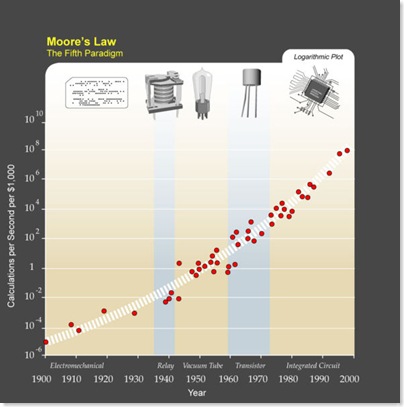We Bring the Sentience
Here is an excerpt from a fascinating, two-part conversation with Nova Spivak, CEO and Founder of Twine.com, on the Buddhist Geeks podcast:
Researchers such as Ray Kurzweil, who's a big thinker, [and] Vernor Vinge, who's a science fiction author, have been talking about a concept called the singularity. Basically, if you plot the increase in computing power, you can see that it's increasing exponentially while the cost is decreasing exponentially.
So by the year 2029, according to their projections, the computing power necessary to simulate a human brain will cost about one dollar. That's pretty amazing. Even if they're a little aggressive and it's 2040, that's amazing.
They're actually projecting that in 2040, artificial intelligence or computer intelligence will be a billion times more powerful than all human intelligence combined. So, we're entering a world which is going to be quite different from the world we're in.
The notion of the singularity is, when this happens, when we reach this point where essentially computing power becomes infinite or essentially infinite, or it's infinitely affordable, at least, we can't predict what's going to happen next. Now these guys, because they don't believe in anything beyond the scientific material worldview, their vision of what happens after the singularity is that machines become intelligent and sentient and they're the next step in evolution and they replace humans.
I think that's wrong. What's much more likely is a form of symbiosis, where humans and machines merge such that the machines really amplify us and we amplify the machines. We bring the sentience, the machines bring this vast computational capability, and essentially the web becomes and extension of our brain.
That doesn't help us become enlightened. That makes our delusion more functional.
- Episode 87: Does the Web have Buddha Nature?
- Episode 88: Technology Makes our Delusion More Functional






